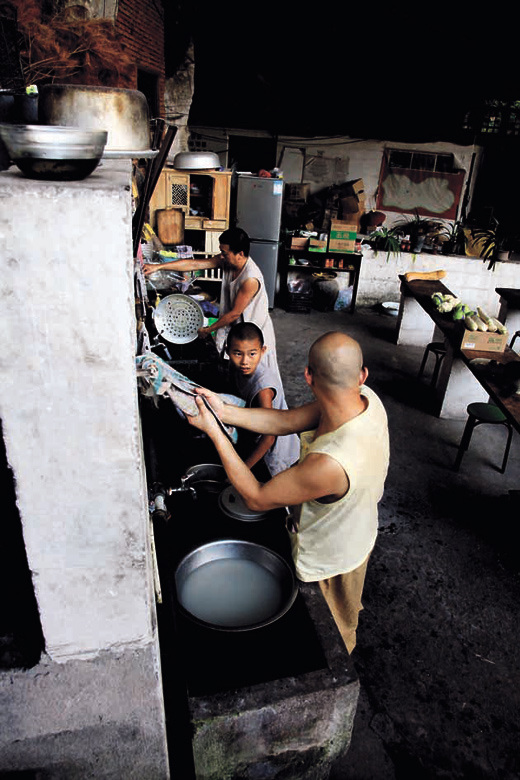

No talking is allowed.
Lunch at 11am is more congee, pickles and steamed buns. If it's too bland, spicy sauce is available for newcomers.
No one complains.
"I like the food," says Zhu Huanyu from downtown Tiantai County. The 52-year-old, born into a devout Buddhist family, has been visiting the temple every year for seven years. He stays for a few weeks at a time.
"I feel Buddha is blessing me and my family, giving me inner peace and guiding me to do good things for others," he says.
Meals are silent. Men and women sit on separate sides of the canteen. After lunch, everyone cleans tables and washes bowls and chopsticks. Those who want to stay another day turn their bowls upside down at their place, indicating that food should be allotted for them the next day.
In the afternoon, Abbot Zhidu lectures on sutras, helping students comprehend difficult passages. Students sit on the floor and are free to ask questions about scriptures and their own personal troubles and anxieties. These can involve deaths of loved ones, love problems, broken marriages, conflicts with parents, work pressure, financial problems and bankruptcy.
Supper is at 5:30pm. Evening class starts at 6:30pm.
When the temple bell strikes at 8pm, everyone goes to bed.
"Life is simple," says Shengfu, 30, a ju shi, or Buddhist who practices Zen at home and lives at the temple for a few days every year.
"It's been condensed to learning, laboring and simple food. You kind of leave all you anxieties behind and concentrate on exploring your own inner world," he says.
"Faith cannot be compelled. Stay or leave, it's up to them. Buddha said everything happens for a reason, just let it be," Abbot Zhidu says. "Despite the harsh life, no one has quit halfway. They stay for weeks. Most solved their problems and went home with a new self."
Among those on retreat, many have had traumatic experiences.
Shanghai local Chen (who declines to give his full name) became a monk this summer after losing his son seven years ago. The young man was helping a classmate on the way to school and his friend demanded the return of a stolen cell phone. The thief stabbed Chen's son to death.
Since then, Chen gave up his interior decoration business and started traveling around China, staying in Buddhist temples. Chen's wife became a nun on Jiuhua Mountain in Anhui Province.
Chen arrived at Tiantai Mountain this summer. "When I came here, I felt very drawn to the place," Chen says. His eyes fill with tears when he thinks of his son.
It seems that everyone has a sad story. The youngest monk, 12-year-old Shengyuan, was an orphan and was taken to the temple by Abbot Zhidu. He grew up at the temple and today is a fourth grader in a nearby school.
He is shy in front of strangers but likes to make faces.
"Remember to switch off the light each time you leave the dorm," he always tells newcomers to the devotion class.
When people spend time together and get along, they tend to open up and share their stories. But one youth remains solitary. The young man, aged around 18, never talks or smiles. He sleeps, eats and labors alone.
"I tried to chat with him, but he refused," says ju shi Cui Lan, 58. She has been staying in the temple for three months. "Let it be. It might be the best way for him to heal himself," Cui says.
Many people romanticize the monastic life and see it as a way to escape the worldly life and responsibilities, at least for a while, Abbot Zhidu says.
"People may get lost in the material world and become frustrated by life's pressures. I understand their wish to leave everything behind, but remember, the temple is not the real shelter," he says. "Buddha can guide them and help enlighten them, but their problems have to be solved by themselves."
If you go: Take the shuttle bus to Tiantai Mountain at the Shanghai South Railway Station's long-distance Bus Center on Laohumin Road. It takes four to five hours, and the one-way bus ticket is about 150 yuan. After you arrive at Tiantai Mountain, you can take a taxi to Ci En Temple. The taxi fare is about 30 yuan.
Nengren Temple in Jiujiang, Jiangxi Province
2013-10-23Tanzhe Temple, older than Beijing City
2013-09-12Hanging Temple in China's Shanxi
2013-08-30Copyright ©1999-2018
Chinanews.com. All rights reserved.
Reproduction in whole or in part without permission is prohibited.